One of the major challenges our clients and Grant Writing Made Easy students tell us they’re facing before we start working together is the extremely challenging task of finding the right grants. Even when they’re familiar with the basics of where to find grants, they often find it difficult to evaluate their fit for the funding opportunity.
With limited time and resources, they (and you!) only want to apply for grants they have a good chance of winning.
Today, we’re explaining exactly how to find the perfect grant. Here are the steps you’ll learn:
- Understand the different types of funders and who they support
- Determine if you qualify
- Know why a grantmaker should fund your work
- Use grants databases to search strategically
- Evaluate the opportunities by looking at the grantmaker’s priorities and history of giving
Step 1: Understand the different types of funders and who they support
Most grants come from corporations/corporate foundations, private foundations, and federal and state agencies.
Depending on your situation, you may find one of these types of funders to be a better fit than another. Corporations, for example, often require awardees to promote and publicize their grants widely. Furthermore, nonprofits will need to be aware of the business’s mission and track-record to avoid being associated with a company that is opposed to their own mission. We like to use the example that an environmental advocacy group would not want to accept funding from an oil and gas company.
Next, we have private foundations, which is the type of funder that often comes to mind when people think of grantmakers. They typically have specific agendas and funding goals. So before applying for a grant from one, research their funding history and mission. Most will only award grants to 501(c)(3) nonprofits, and many have other funding restrictions.
Federal agencies support the widest range of organizations and individuals. Before applying for a grant from a government agency, you should be aware of their (extensive) reporting requirements. Read the request for proposals carefully, and make sure that you have the capacity to fulfill these requirements. If you’re interested in a grant from a federal agency, then you can start your search at Grants.gov. (More on this site below.)
Step 2: Determine if you qualify
The second step in finding the perfect grant is to figure out if you are eligible for funding. Most grants are awarded to organizations like the following:
- A nonprofit organization (most typically with a 501(c)(3) status)
- City, county, or state government
- A tribal organization
- An independent school district
- An academic research institution (college or university)
There are also limited funding opportunities for the following individuals and organizations:
- Academic researchers and writers (these are typically limited to individuals with advanced degrees and a reputable publication record)
- Individual artists (there are a handful of foundation grants available)
- Small for-profit businesses (there are very few opportunities available for for-profit businesses, and most are for mission-driven companies)
Once you’re sure that you’re eligible for funding and understand which types of funders are likely to support your work, it’s time to find out what the perfect grant for you will look like.
Step 3: Know why a grantmaker should fund your work
The best way to get started figuring out what the perfect grant will look like is to write out answers to the following questions:
Who are you going to serve? Write down their demographic information: race, gender, ability, socioeconomic status, geographic location, etc. Also write down the particular problems they’re facing, such as poor health outcomes, low educational outcomes, environmental dangers, etc.
What unmet need or new issue is your work going to address? Get specific and pick just one area you are going to address. Jot down a few lines about how you know that the need exists.
What’s your plan to meet the need or fill the gap in research that you’ve identified? Be specific and sketch out the beginnings of your program design or research process.
Why should a grantmaker fund your work? Imagine what mission it fulfills or funding aims it is aligned with.
Step 4: Use grants databases to search strategically
Now that you know all about the types of funding available and what your perfect grant will look like, it’s time to actually start searching!
There are many grants databases out there, but these are the 3 that I recommend to students and use to search for grants for clients.
Grants.gov
This site is free to use and only includes grants from the 26 federal granting agencies. You can narrow your search results by sorting them by newest opportunities, categories, agencies, and eligibility.
The RFPs from these 26 agencies are typically robust and detailed. Not only this, but each of the agencies also has grant officers, who can answer you questions about the opportunities.
Grantstation.com
This is one of the best grants database options for nonprofits. It lists foundation and corporate charitable grant opportunities as well as state and federal grants and loans.
It covers U.S., Canada, and international opportunities. Like Grants.gov, you will be able to search either by keyword or with the advanced search feature that allows you to search by geographic focus, areas of interest, target populations, and types of support.
GrantStation is a paid grants database, but when you join us in GWME, you’ll get a coupon to purchase a year subscription for $99. The normal price is $699/year.
Foundation Directory Online (FDO)
Foundation Directory Online (FDO) is another great grants database option. It can be more expensive, with prices ranging from $87 a month to $200 a month, depending on the depth of information you select. However, you can go here to find one of the 450 U.S. public U.S. libraries that have subscriptions you can access for free at that library (the physical location of the library).
The advantage of FDO is that it allows you to do keyword searches on 990-PFs, which are tax forms all private foundations must file with the IRS. This is an advantage because many foundations do not have online presences (FDO claims the rate of foundations without sites is 90%).
This service also has more advanced search tools and features like information and analyses that will help you decide whether this grantmaker is likely to fund your work.
Step 5: Evaluate the opportunities by looking at the grantmaker’s priorities and history of giving
After you find some opportunities, you’ll need to evaluate them to make sure that you spend your time and effort only on grants that are a great fit for you or your organization.
The best way to do this evaluation process is to create a spreadsheet with the following columns:
- Grantmaker name (with hyperlinked website)
- Grant categories funded (animal rights, for example)
- Type of support (general operating funds, technical assistance, etc.)
- Dollar range awarded
- Important dates in the grant cycle
- Prospect evaluation
Now, the final column is the toughest, so let’s dive a bit deeper. How do you evaluate whether an opportunity is the perfect grant or not?
Here are a few questions to help you decide:
Do the funder’s priorities align with your mission? (The answer here should obviously be “yes!”)
Does applying for the grant require you to provide a different service or design an entirely new program? (Typically you want to be careful with grants that will require to expand your scope too much.)
If you’re an academic, is the grant for your research field/subfield? (Again, the answer here should be “yes!”)
To best answer these questions, visit the funder’s website and research their giving history. You can do this by searching for them on 990finder.com and looking through their recent tax documents.
If you’re ready to learn more secrets to finding the perfect grant, check out our comprehensive course, Grant Writing Made Easy.
If you want someone to do the grant search for you or alongside you, book a 1-on-1 coaching session with me.
Have questions about the course? Just email me at support@writegoodco.com, and I’ll get back to you!







